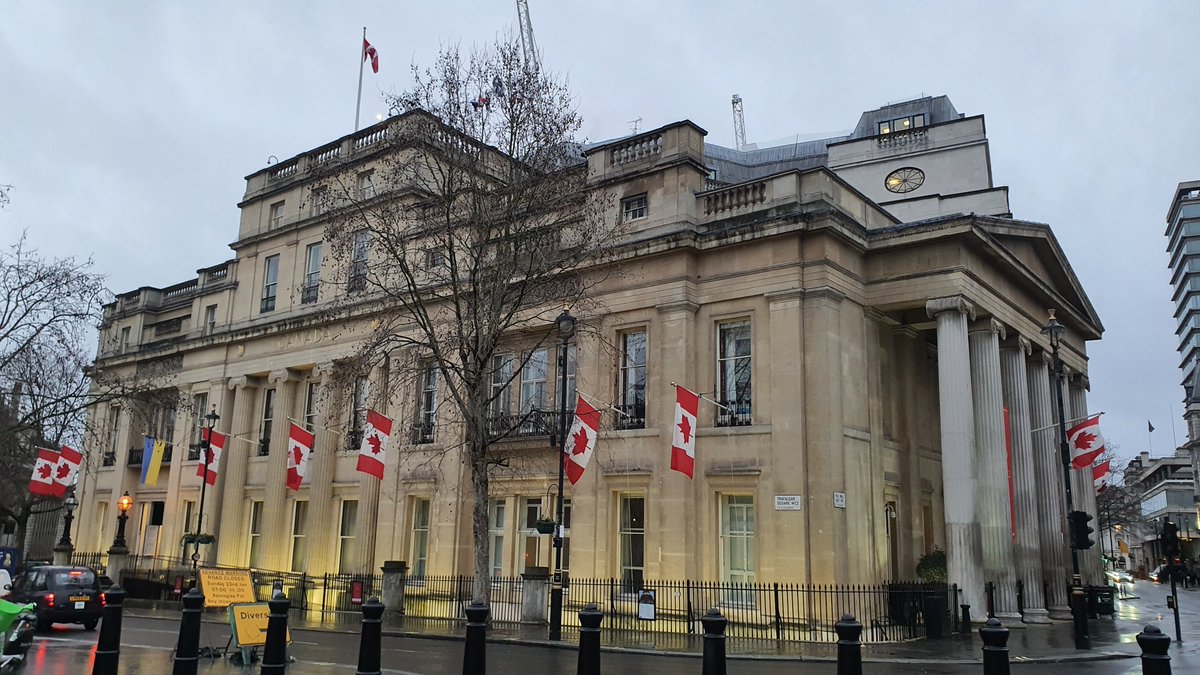I get a lot of questions on the portrayal of private members' clubs in Yes, Minister.
I'll try to answer them in this thread.
We see at least 9 club rooms in Yes, Minister & Yes, Prime Minister; though they could be portraying as few as 3 clubs. Read on for more details...



I'll try to answer them in this thread.
We see at least 9 club rooms in Yes, Minister & Yes, Prime Minister; though they could be portraying as few as 3 clubs. Read on for more details...


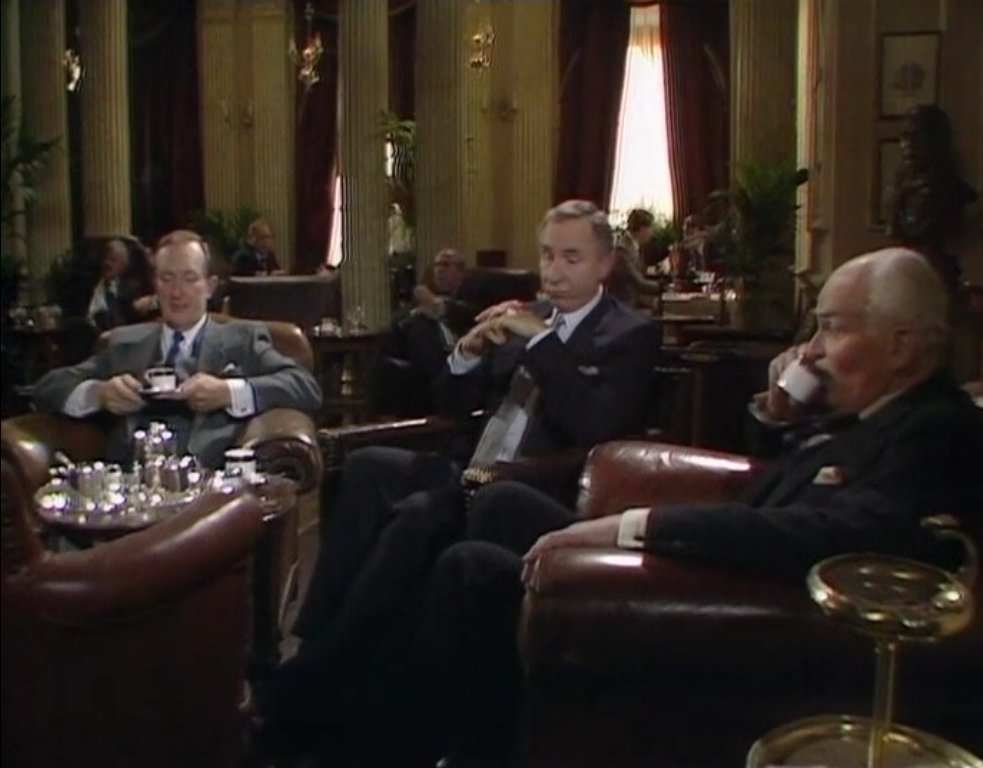

Which clubs are they meant to be?
The books are much clearer on this than the TV series. Sir Humphrey & Sir Arnold are both members of the Athenaeum. That’s explicitly stated in their diaries, whenever they meet at “The Club”.
Permanent Secretaries have long been found there.



The books are much clearer on this than the TV series. Sir Humphrey & Sir Arnold are both members of the Athenaeum. That’s explicitly stated in their diaries, whenever they meet at “The Club”.
Permanent Secretaries have long been found there.




It’s further complicated by a couple of instance of Sir Humphrey meeting his great rival, Sir Frank Gordon of HM Treasury, for lunch at the Reform Club.
But the clear inference is that Sir Frank is hosting both of these lunches at the Reform, where he is a member.

But the clear inference is that Sir Frank is hosting both of these lunches at the Reform, where he is a member.


In the 1960s & 1970s, the Reform hit the peak of its phase as a "Treasury works canteen", rivalling the Travellers (as the Foreign Office's club of choice) next door.
It would have been near-certain for Sir Frank to have been a Reform Club member by the 1980s.
It would have been near-certain for Sir Frank to have been a Reform Club member by the 1980s.
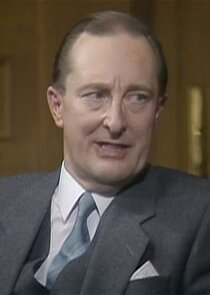
In the TV series, the exact identity of the clubs is left ambiguous. The explicit naming of the Athenaeum and Reform didn't happen until the publication of volume 1 of the book version of Yes, Prime Minister in 1986 (and is repeated in volume 2). 

The Yes, Minister pilot (Open Government) gives us a club set that's never used again - though design elements are recycled later on.
I call this "Club A".
Already, the relationship foundations are laid, with Sir Humphrey & Sir Arnold being fellow members, and Bernard a guest.



I call this "Club A".
Already, the relationship foundations are laid, with Sir Humphrey & Sir Arnold being fellow members, and Bernard a guest.




Here, Sir Humphrey wanders off to take a call from the club's phone booth in the pilot episode, and we get some lovely period detail, especially with the light fitting. We'd never see this again. 



Series 2 & 3 (episodes The Devil You Know & The Challenge) give us "Club B".
This is really a recycling of elements of the "Club A" set from the pilot (pillars, armchairs, etc), in a similar configuration, but with major changes, too - bookcases where there were paintings, etc.



This is really a recycling of elements of the "Club A" set from the pilot (pillars, armchairs, etc), in a similar configuration, but with major changes, too - bookcases where there were paintings, etc.




It's quite possible/likely that this is intended to be the same club as "Club A" from the pilot, after a major redecoration. Clubs redecorated & reinvented themselves far more often than they liked to admit, with plenty of "historic" décor being modern pastiches. 

Series 2 & 3 (eps The Quality of Life, The Challenge & The Middle-Class Rip-Off) show us this club dining room set, which I call "Club B2".
You might think it's an entirely different club, with of-its-time 1970s wallpaper - but it's explicitly stated to be part of the same club.



You might think it's an entirely different club, with of-its-time 1970s wallpaper - but it's explicitly stated to be part of the same club.




In The Quality of Life, Sir Humphrey goes straight from a lunch in "Club B2", to walking through the "Club B" set, where he bumps into Sir Desmond Glazebrook.
It's clearly meant to be the same club - one set is the dining room, the other the smoking room.



It's clearly meant to be the same club - one set is the dining room, the other the smoking room.



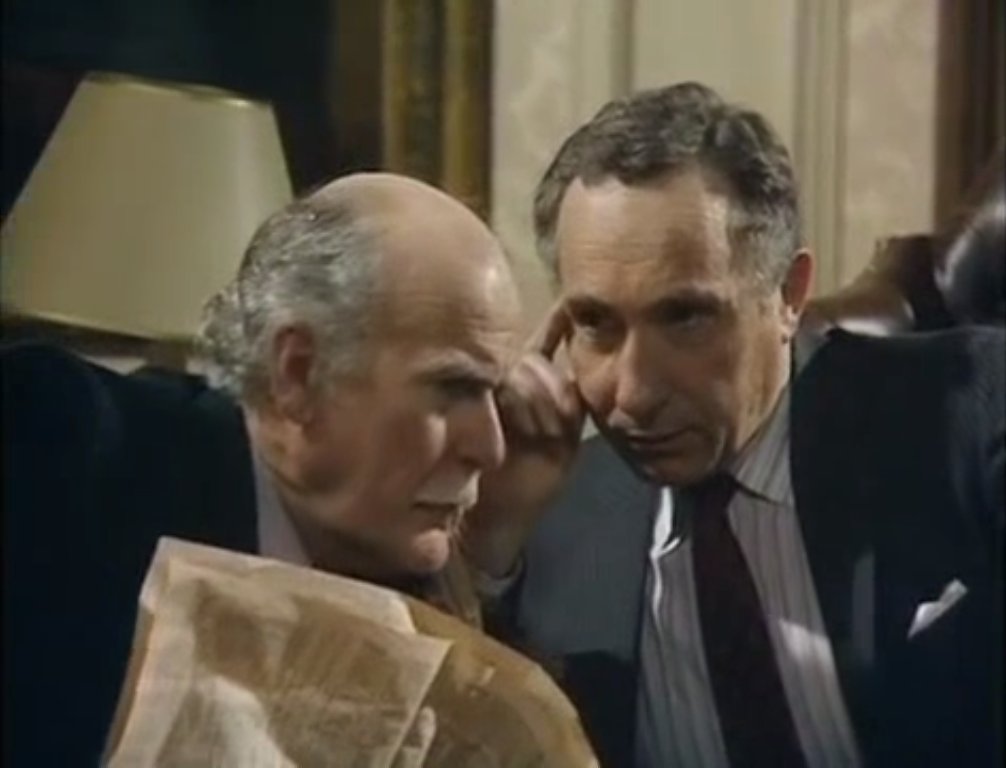
The windows of "Club B2" are interesting: they have wooden panelling on the recesses, reminiscent of several clubs (the Reform comes to mind - see the far-right of the BW image).
The radiator is way out of place (though might be a reflection of the shabby state of 1970s clubs).

The radiator is way out of place (though might be a reflection of the shabby state of 1970s clubs).


In the Yes, Minister special, Party Games (where Hacker becomes Prime Minister), we get "Club B3" - it's a new set, with a new dining room, and new wallpaper...but the "look" (esp the wallpaper) is sufficiently similar, that it was almost certainly meant to be the same club. 



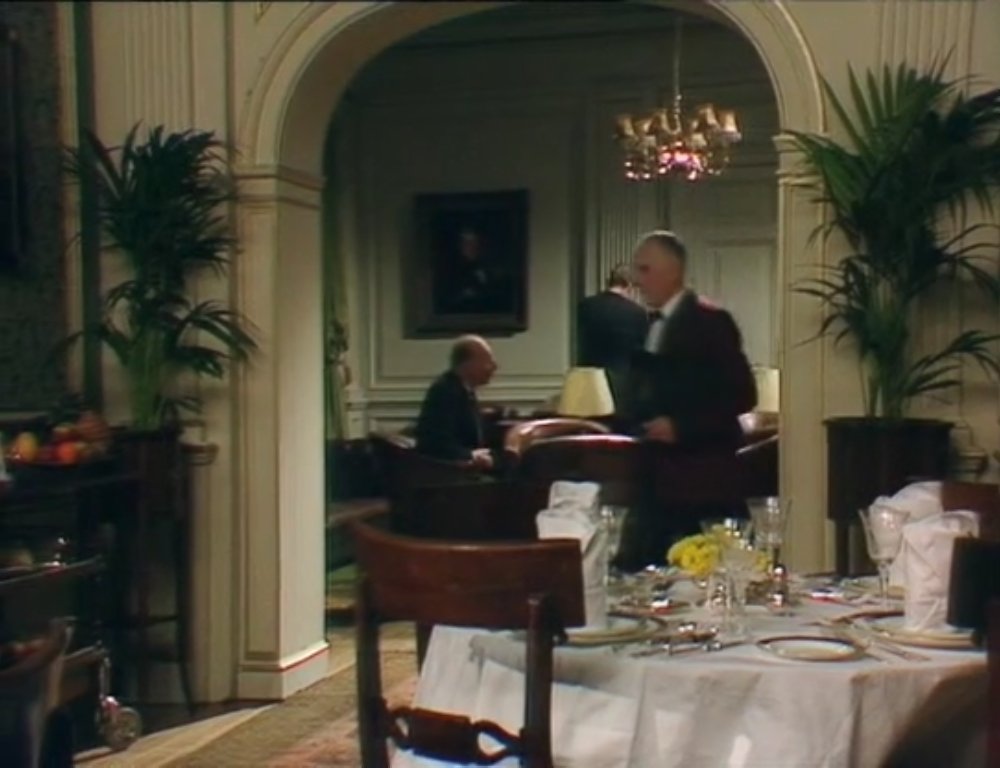


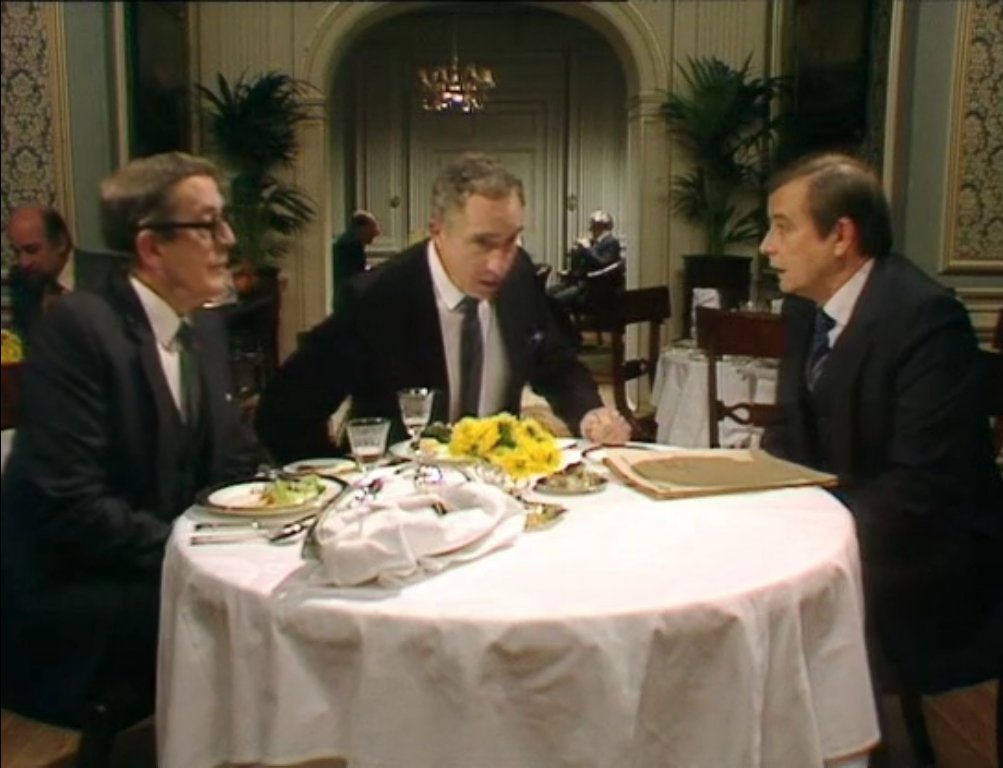
Then we have the generic club set in series 1 (eps The Official Visit, The Economy Drive, The Writing on the Wall & The Right to Know).
They recycled the pillars from the pilot, but created a new set - which was presumably torn down after the 1st series & never used again.



They recycled the pillars from the pilot, but created a new set - which was presumably torn down after the 1st series & never used again.




This series 1 set - almost certainly intended to be the same club as Clubs A, B, B2 & B3 - was arguably more authentic than some of the others in Yes, Minister.
It closely follows the feel of the Morning Room (or Bar) of the Athenaeum.

It closely follows the feel of the Morning Room (or Bar) of the Athenaeum.


Incidentally, the real-life Bar of the Athenaeum is now an occasional filming location - seen here in the Jeremy Thorpe drama A Very English Scandal, where it doubled for the Carlton Club.
But Yes, Minister had limited location filming.
But Yes, Minister had limited location filming.
https://twitter.com/SAThevoz/status/1002584081169862656
In the series 2 opener, The Compassionate Society, we unambiguously see a different club, when Sir Humphrey meets Sir Ian Whitchurch, Permanent Secretary to the DHSS... 







Unlike Clubs A/B/B2/B3, which use many 'typical' but non-specific club design elements, the set for Sir Ian's club is clearly modelled on the Smoking Room of the Reform Club, in its lighting, pillars & furniture.
It's a very detailed set - we never see it again in the series.

It's a very detailed set - we never see it again in the series.

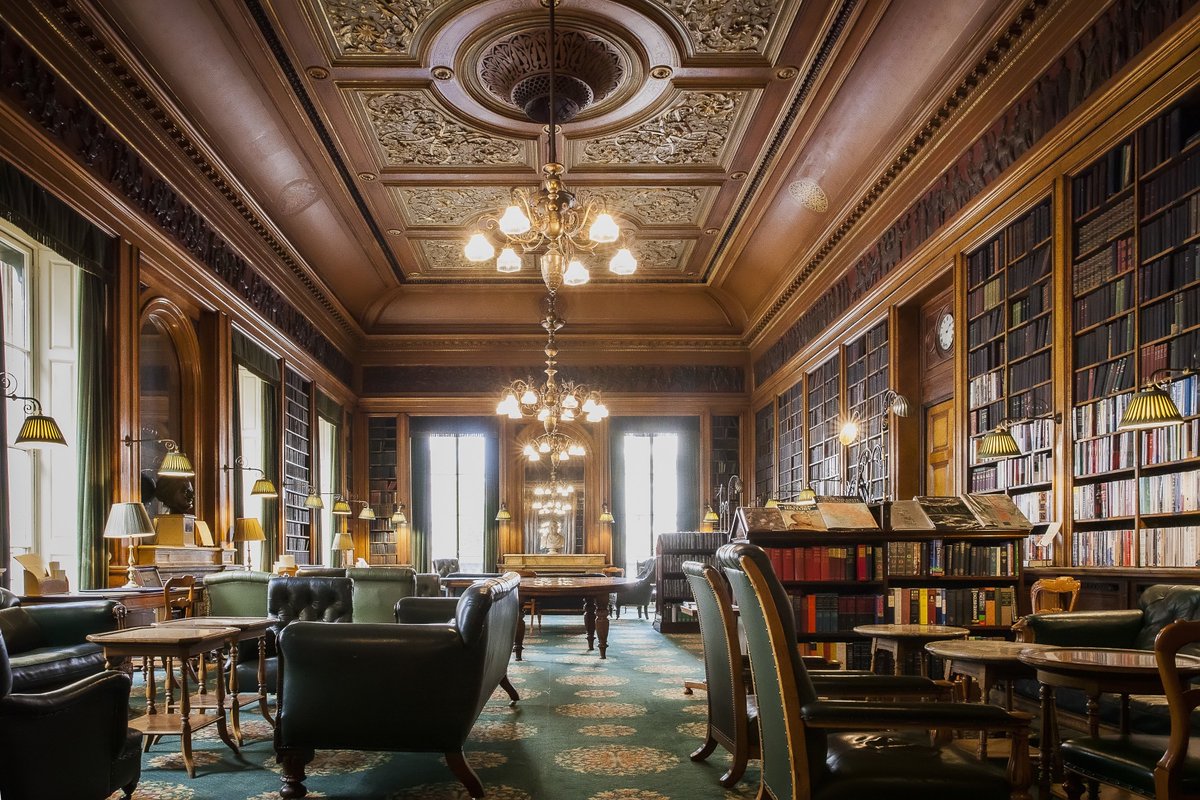
Then in series 3's The Bed of Nails, we see Sir Humphrey briefing journalist Peter Maxwell, "accidentally" leaving a confidential document after lunch.
The set looks a lot like the old London Press Club on Wine Office Court, off Fleet Street, before it lost its premises in 1986.



The set looks a lot like the old London Press Club on Wine Office Court, off Fleet Street, before it lost its premises in 1986.




Before I move onto Yes, Prime Minister, a few words about Bernard.
His status in these clubs is very precarious - he's usually treated as an errand boy, delivering a message. He may be a civil service high-flier, but he's not (yet) a member of the Athenaeum.

His status in these clubs is very precarious - he's usually treated as an errand boy, delivering a message. He may be a civil service high-flier, but he's not (yet) a member of the Athenaeum.
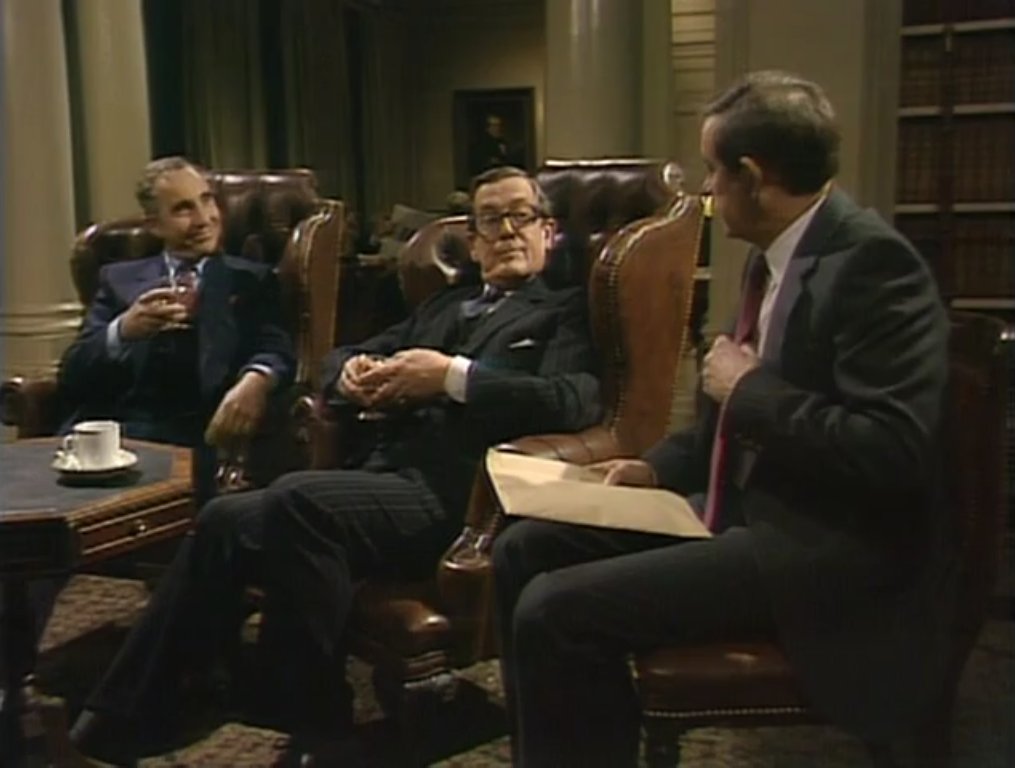

In Yes, Minister, Bernard's presence is more tolerated than invited - he's there to collect signatures on papers, & occasionally invited to join Sir Humphrey & Sir Arnold for a drink, but always as an outsider. ("Get yourself a coffee", Sir Humphrey says, as he sips wine.) 

The show also makes a recurring point - in both Yes, Minister, and Yes, Prime Minister - of showing us establishing shots with signs addressed to "MEMBERS", that emphasise we're heading into a private domain for these scenes. 

By the time the show became Yes, Prime Minister in 1986, it was one of the BBC's leading shows & the budget had increased. No more tatty club sets with 70s wallpaper.
We see 2 club rooms throughout Yes, Prime Minister, each a variant on the other, recycling props.
We see 2 club rooms throughout Yes, Prime Minister, each a variant on the other, recycling props.

We see the 1st of these club rooms across both series of Yes, Prime Minister (eps The Smoke Screen, One of Us, Power to the People, & The National Education Service).
Still no sign of Bernard. He's now PPS to the Prime Minister, but he doesn't seem to have been elected a member!



Still no sign of Bernard. He's now PPS to the Prime Minister, but he doesn't seem to have been elected a member!




The 2nd of these Yes, Prime Minister club rooms is a dining room that's clearly a redress of elements of the 1st set, with recycled pillars, chandeliers, plants, etc.
Given the shared design elements with the 1st room, it's clearly intended to be part of the same club.



Given the shared design elements with the 1st room, it's clearly intended to be part of the same club.




It shows up in one episode of each series of Yes, Prime Minister - A Real Partnership, and Man Overboard.
Is it intended to be the same club as the (admittedly tattier) Athenaeum-type club set we've seen before, in Yes, Minister? There's one obvious architectural clue.
Is it intended to be the same club as the (admittedly tattier) Athenaeum-type club set we've seen before, in Yes, Minister? There's one obvious architectural clue.

Remember the white wooden panelling by the window recesses, in "Club B2" in Yes, Minister? That's echoed in the Yes, Prime Minister club.
Then again, that's far from conclusive.

Then again, that's far from conclusive.


On the other hand, staff uniforms in both rooms of the Yes, Prime Minister club are identical to the staff uniforms we saw in the Reform Club-type club seen in the Yes, Minister episode The Compassionate Society. 





And then there's Sir Frank, holding court over coffee, among some pillars that are distinctly reminiscent of the Reform Club atrium, where coffee is served. 

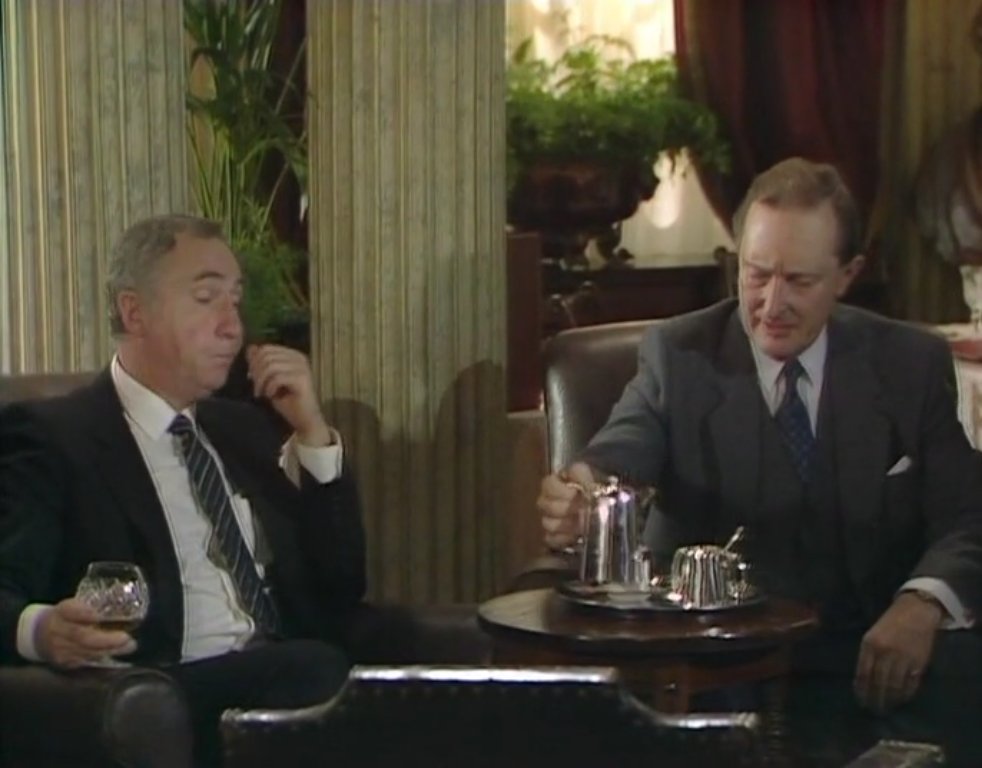
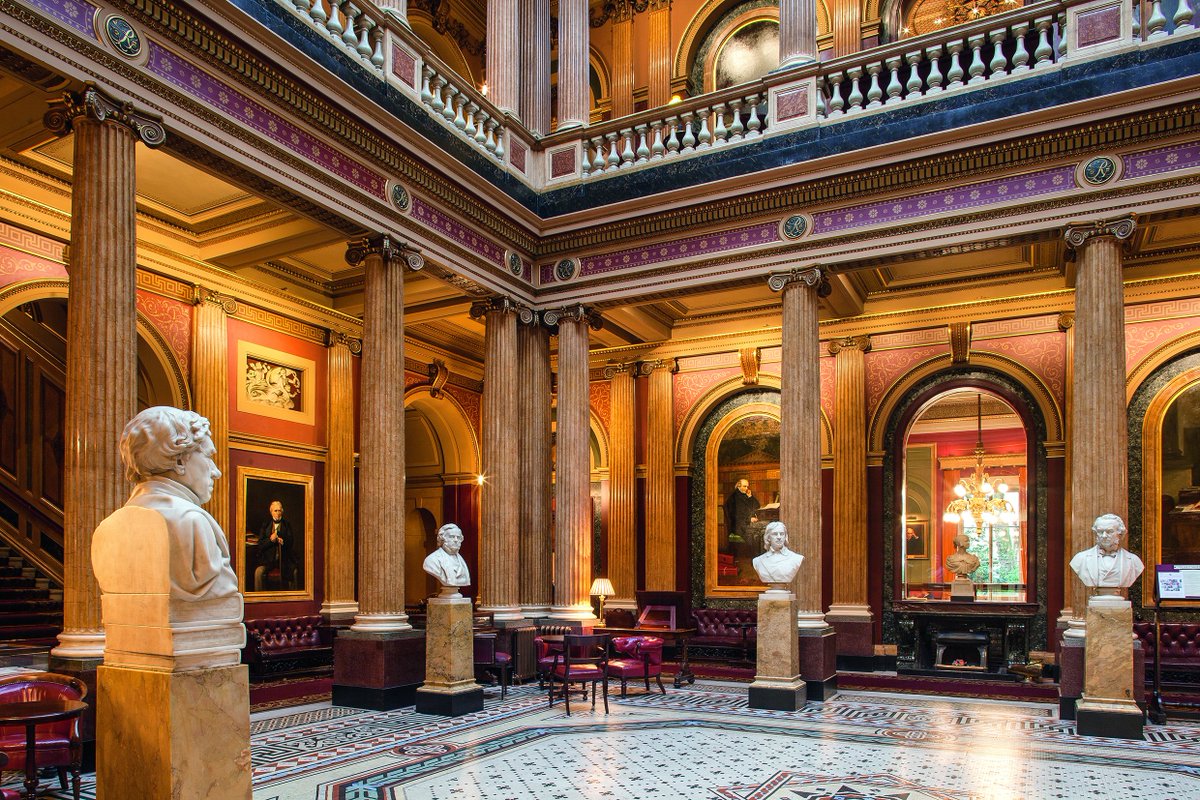
Conclusions? The books couldn't be clearer. The TV obfuscates considerably.
Clubs A, B, B2 & B3 & "series 1 club" seen in Yes, Minister are probably all the same club, with redecorations, meant to portray the Athenaeum.
The Yes, Prime Minister club...is a lot more ambiguous.
Clubs A, B, B2 & B3 & "series 1 club" seen in Yes, Minister are probably all the same club, with redecorations, meant to portray the Athenaeum.
The Yes, Prime Minister club...is a lot more ambiguous.
They spent a lot more money on the Yes, Prime Minister club set (and it doesn't particularly resemble what we'd seen before - it's lighter, airer & more sumptuous).
So you get the sense that every "generic club scene" was filmed using those elements, regardless of location.
So you get the sense that every "generic club scene" was filmed using those elements, regardless of location.
And in Yes, Minister, we see the Reform Club & London Press Club, and those are NOT the haunts of Sir Arnold & Sir Humphrey.
There's also ambiguity as to whether some other scenes are in clubs, high-end restaurants, or offices. (A work desk in the background suggests an office.)
There's also ambiguity as to whether some other scenes are in clubs, high-end restaurants, or offices. (A work desk in the background suggests an office.)
(If you enjoyed this, you may also enjoy my mega-thread - which I technically never finished - on the portrayal of clubs in James Bond films.)
https://twitter.com/SAThevoz/status/1577644547236106247
Oh, and buy my new book, obviously!
It's a comprehensive, critically-acclaimed, myth-busting history of London Clubland through the ages, packed with funny anecdotes.
"Hugely entertaining & full of stuff I didn't know I wanted to know" Jonathan Lynn
amazon.co.uk/Behind-Closed-…
It's a comprehensive, critically-acclaimed, myth-busting history of London Clubland through the ages, packed with funny anecdotes.
"Hugely entertaining & full of stuff I didn't know I wanted to know" Jonathan Lynn
amazon.co.uk/Behind-Closed-…
• • •
Missing some Tweet in this thread? You can try to
force a refresh






